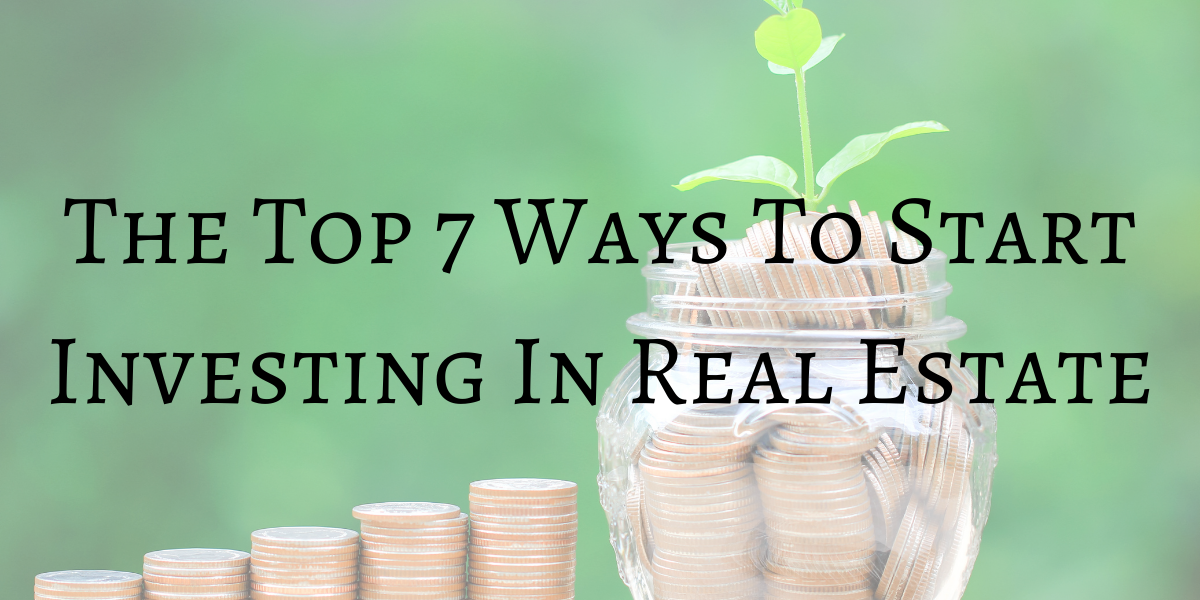Best Ways To Start Investing In Real Estate
Real estate investing can help you build wealth, whether you purchase your primary residence or a multi-family property.
Here are seven methods to do it.
1. Multi-family property available
Multi-family properties can be a great way for you to invest in real property if you are eligible for a mortgage loan.
Mancuso says, “You can have one side rented out and they can pay a good portion of your mortgage.”
Multi-family properties may have as many as four units. This can increase your potential revenue. You may eventually be able to sell the units individually for a greater return on your investment.
2. Find a roommate
Mancuso shares, “Investment beginners have a lot of roommates.”
If you are looking for a single-family house and want to share a room with someone, it might be worth renting out a room to someone you already know.
This could help you pay off a portion of your mortgage and maybe even provide some company.
3. You might consider a short-term rental
You might have extra space, such as a finished basement or in-law suite. This square footage could pay you back in the form of a short-term rental.
You can list your space on sites such as Airbnb — you might make more if you are near a tourist attraction.
Because they usually earn a higher rate per night than a long-term rental, short-term rentals can make a great income stream.
Mancuso recommends that you live in your home at least one year to get used to the strategy. This will allow you to assess the flow and rhythm of your new home and make a decision about how to move forward with renting.

4. You might also consider a long-term rental
You might not want to have guests come in all the time, but you are still interested in renting out your property. A longer-term rental may be right for you if that’s the case.
You can rent out part of your house or the entire thing to travel the country and live your #vanlife dream. A longer-term rental can provide stability and security in your income.
You only need to manage one tenant and not multiple vacationers each day.
Roofstock pre-vets single family investment rentals homes for those who are unsure where to look. This removes a lot of the upfront work and risk.
One caveat: You will likely need a property manager to manage your home while you are away.
5. The tried and true buy-and hold
Are you unsure if you are up for sharing your home with roommates? It’s completely fair! You can also do nothing. This is known as the buy and hold strategy. This is when you hold onto a property for many years and then pay off the mortgage as it increases in value.
Ok, we may have exaggerated a little when we said that you couldn’t do anything. If you want to increase the property’s value, you still have to maintain it and make improvements periodically. It’s unlikely that your investment will be worth much if you do nothing and let it deteriorate for years.
6. Are you ready to flip?
Flipping is easy: You buy a house and fix it up. Then you sell it to make a profit.
It’s not. Flipping real estate can make you money, but you need to be knowledgeable about the process.
Flipping is a science. Before they purchase properties to flip, experienced investors do a lot of calculations. A variety of factors are considered by experienced investors, including:
- The cost of the house
- Renovations cost
- It is the cost of maintaining the property while repairs are being made. This includes costs such as mortgage payments, utility bills, and lawn maintenance.
- After repairs are completed, the home’s estimated value will be put on the market. This is also known as the ARV (after repair value).
For a flip, most experienced investors will not spend more than 70% of the ARV of a home. It’s not worth the effort, time or expense to flip a home if there is no profit margin.

It’s important to remember that the top investors have many years of experience in these calculations. This will make it more difficult for you to come up with realistic numbers.
Even the best pros sometimes make poor decisions and miss a good opportunity to flip a property. This may not seem like a huge deal for an investor who purchases hundreds of properties per year, but it can have devastating consequences for a buyer who is relying on one major investment to flip a property. Flips can be risky and complicated business.
Should you consider flipping? It all depends on how hard you are willing to work and the number of people you have on your flip team. Mancuso recommends that you choose a real estate agent and a real estate lawyer to assist with renovations.
You’ll need to be able to identify the key factors in a flip, along with having the right team. You can ask your agent for help, but here are some key points to remember: location, features and rooms, layout, home style and type, property size (larger homes cost more to maintain and landscape), the health of the local realty market, and many other factors.
Even more important is to consider the home’s age — also known by when it was constructed — and the relative pros or cons of houses built at that time.
Mancuso says, “If you are looking for flips,” he explains. “Mechanically everything is sound — the roof and heating system, as well as the windows. They might need some decor updates, such as removing wallpaper or refinishing floors.
She also mentions that there are many ways to update a kitchen without breaking the bank. These include recessed lighting, a trendy back-splash, fresh painted cabinets and walls as well as updated hardware and fixtures.
Flipping is not for everyone. Flipping is a difficult business with small margins. It’s best to have some experience.
7. Other types of investments
Are you not ready to purchase an investment property or a home? You can still invest in real estate with as low as $500, sometimes even less. This is a list of non-exhaustive ways that you can get started in real estate investing, without having to purchase a property.
- Online investing platforms make it possible to invest in real property for a small amount. The minimum investment depends on which platform you choose, but it can be anywhere from $25 to $1,000. These are some of the most popular options:
- Fundraise
- RealtyMogul
- Crowdstreet
- Prosperity
- PeerStreet
- Lending Club
- Another popular form of passive real-estate investment is:
- REITs (real estate investment trusts)
- Real estate mutual fund
- EFT – Real Estate Traded Fund
- Real estate investment group
- Private equity fund (Note that often requires large upfront investments)
- Opportunity fund
What amount of money are you willing to put into real estate investment?
Real estate investing doesn’t require you to have millions of dollars in your bank account. Start with just $25
You won’t get rich overnight from a $25 investment.
You should feel comfortable with the amount you are putting into your portfolio. Let’s take a look at some different investment levels and discuss what’s possible.
- $25 to $1,000
These online investing platforms are great. These platforms are a great way for small investments. Most require at least $500 upfront, while a few only require $25. Many promise annual returns between 6% to 12%.
However, success is not guaranteed. These platforms are similar to investing in stocks. You have no control over the outcome. It’s still a good option for new investors, as it doesn’t involve the upfront purchase of an investment property.
Problem is? It’s difficult to understand the differences between each option. BrickFunding, an app that compares each platform’s merits to help you select the best investment option for you, is here.
- $1,000 to $5,000
Real estate investment trusts (or REITs) are a good option if you’re looking to invest more. REITs buy properties, whether commercial or residential. You then invest in the property portfolio. REITS are similar to investing in stocks, even though you are dealing with real estate.
Real estate investment groups are a great way to own a part of a property portfolio. These groups buy or build homes and rent them out to investors. The investment group takes a cut of future rents and stays on as a manager.
- $5,000 to $10,000
You have $5,000 to invest in real property? There are many options.
- You can invest with friends and pool your funds to make a downpayment on a rental property. Make sure you have a contract that clearly outlines all your responsibilities!
- You can add a small kitchenette and/or bathroom to your home and let it go on a short-term rental site.
- Roofstock allows you to become a fractional owner for a single-family home by investing as little as $5,000. You get a 30-day money back guarantee. They also guarantee a signed lease within 45 days. Or they’ll pay your rent for up to one year.
- $10,000 and more
This investment level may allow you to begin thinking about buying a property. You can also rent out additional space in a multi-family house, which allows you to live in one apartment and rent the rest.
You can usually get better terms on a mortgage if your home is your primary residence.
- You will pay much higher interest rates for an investment property you won’t live in and you will need to deposit 20% to 25%.
- You’ll receive lower rates for a primary residence. Depending on your financial situation, you might be able to pay as little as 3.5% on an FHA loan or 3% on a conventional loan.
A condo is a great way to get your feet wet.
Mancuso suggests that buying a condo can be a great way to start investing if you don’t have the funds for a multifamily home or a single-family house.
She insists that it’s all about starting small. I’ve seen buyers start small and get a condo. The condo is then sold and a new single-family home purchased. They may decide to keep the condo or rent it out, as they have paid it down.
Condos also have another perk: The COA covers most exterior maintenance, which is useful when renting out a house. You should always check the COA bylaws as they may contain rules regarding renting out your unit.
Mancuso says, “You can rent out that condo for great money — more than what you’re paying for the mortgage at these low-interest rates — so you’re ready for your next move.”
Three easy steps to get you started
You think this real estate investing thing sounds fantastic, and are ready to get started. You have some ideas of where to put your money and feel confident that you can handle the commitment.
Great! This is your three-step strategy.
1. Choose the right team
The right team is key to success in real estate investing. These are some experts that you should have by your side.
- A top buyer’s agent with extensive investment experience will help you purchase a property.
- A real estate lawyer to protect your legal rights
- A financial advisor can help you plan your investments
- CPA can help with taxes
- To protect your title claim, a good title/closing firm is necessary
- A home inspector will give you an honest assessment about the property’s needs.
- Securely finance your property with a trusted lender
- Reliable tradespeople for any repairs or renovations
- If you are unable to manage the rentals yourself, a property manager will handle them
You don’t necessarily need to have a huge real estate team if you are just investing a few dollars on an online platform. However, it is a good idea to consult a trusted financial advisor.
2. Create your investment strategy
To create the best investment strategy, work with your team.

Key players in this process will be your financial advisor and real estate agent. They will help you determine the best way to build wealth for your particular circumstances.
Perhaps you have two jobs already and are unable to manage a house and its maintenance. Capital investments may be more suitable in this case. If you have a lot of money saved and are willing to take on the challenge of a fixer-upper rental investment, then you might be able to do so.
3. Make your move
Now you are ready to invest. You have done your research and analyzed your options. Congratulations! You are now a real-estate investor. Let’s hope the profits start rolling in!
You can improve and grow in new directions
Real estate investing has the advantage of being flexible and able to grow in new directions.
- You can deepen your understanding of local markets and learn about the best places to rent properties.
- Foreclosure investing is an option.
- Maybe you are ready to purchase an investment property to fix-and flip or buy-and hold.
- If you are interested in becoming a landlord, it is worth learning the best practices.
If this doesn’t convince you that real estate investing is possible for everyday people, then we don’t know what will.




